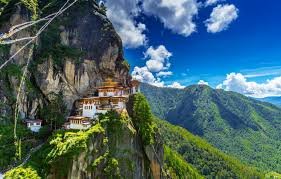Bhutan
Bhutan, officially known as the Kingdom of Bhutan, is a small, landlocked country in South Asia, nestled in the eastern Himalayas between China and India. Known for its stunning landscapes, rich biodiversity, and vibrant culture, Bhutan offers a unique blend of natural beauty and traditional heritage.
Geography and Climate
Bhutan's terrain ranges from subtropical plains in the south to the sub-alpine Himalayan heights in the north, where some of the world's highest peaks rise, including Gangkhar Puensum, the highest unclimbed mountain in the world. The country experiences a varied climate with the southern regions being hot and humid, while the northern regions are cold and snowy, particularly in winter.
Culture and Religion
Bhutanese culture is deeply influenced by Buddhism, which is the state religion. The country's spiritual heritage is evident in its numerous monasteries, stupas, and prayer flags adorning the landscape. Bhutan is famous for its dzongs, which are large fortress-monasteries that serve both religious and administrative purposes. Traditional arts, such as thangka painting, weaving, and wood carving, thrive here.
Government and Economy
Bhutan is a constitutional monarchy with a parliamentary democracy. The King of Bhutan, known as the Druk Gyalpo, plays a crucial role in the country’s governance alongside the elected parliament. Bhutan's economy is primarily agrarian, with agriculture, forestry, and hydropower being major sectors. The country has also placed a strong emphasis on sustainable development and environmental conservation.
Gross National Happiness
One of Bhutan's most unique aspects is its development philosophy centered around Gross National Happiness (GNH), which prioritizes the well-being and happiness of its citizens over purely economic growth. This approach includes sustainable development, conservation of the environment, preservation of culture, and good governance.
Tourism
Bhutan limits tourism to preserve its culture and environment, implementing a high-value, low-impact tourism policy. Visitors are required to book their trips through licensed tour operators and pay a daily fee that covers accommodation, food, transport, and a guide. Popular tourist destinations include the Paro Valley, home to the iconic Paro Taktsang (Tiger’s Nest Monastery), the capital city of Thimphu, and the ancient capital of Punakha.
Festivals and Traditions
The country is known for its vibrant festivals, or tshechus, which are held annually in various dzongs and monasteries. These festivals feature traditional mask dances, music, and religious rituals, attracting both locals and tourists. They are a time for socializing, spiritual renewal, and celebrating Bhutanese heritage.
Overall, Bhutan offers a unique and enriching experience with its pristine natural environment, profound spirituality, and a deeply rooted cultural identity.
| Languages spoken | Bhutanese, English |
|---|---|
| Area (km2) | 38394 km2 |
| Country name | Kingdom of Bhutan |

